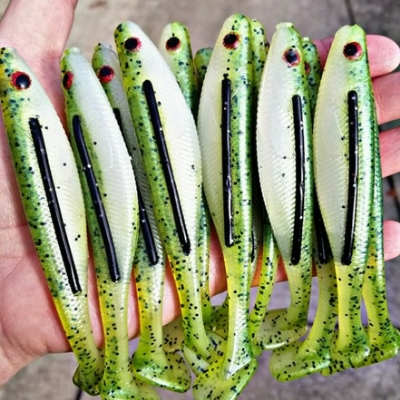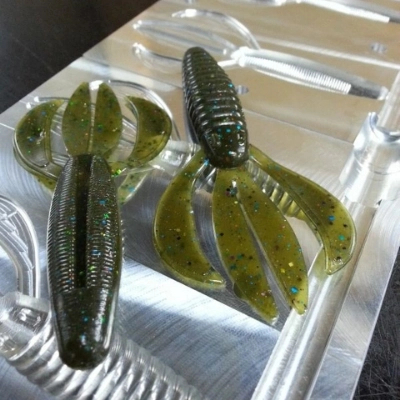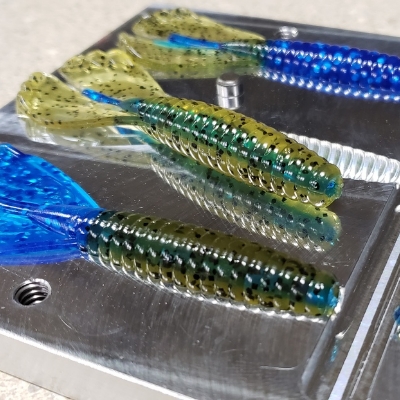Spring Time Bass Fishing: Choosing Baits and Molds for Reaction Strikes
By Angling Ai on 20th Mar 2023
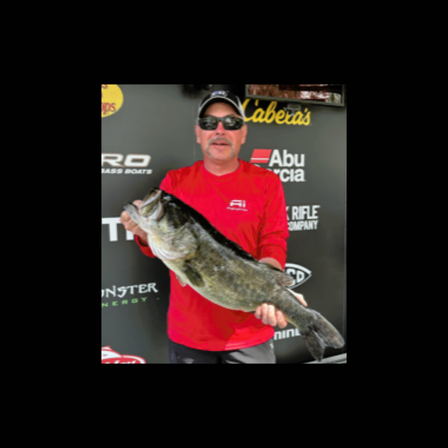
It is officially spring! And that means the time has come for most of the country to start fishing. If bass is your chosen fish, then the best time of year has either started or is about to begin. With bass in their typical spawning patterns, anglers will try to take advantage of this while on the water. Here are some helpful tips to help you catch more bass this spring:
Spawning Tendencies:
Bass anglers love the spawn. Sight fishing for large bass on beds is, to most anglers, the best time of year. Some would even say it is like cheating the system. If the water is clear, it can still be quite the challenge to get a stubborn bass to strike. Understanding the nature of bass and their surrounding area is key to producing quality fish.
Spawning bass are driven by water temperatures. Bass will begin to stage for the spawn when the water temperatures are 48 to 55 degrees Fahrenheit. They will begin to move from deeper water and begin to stage off points or ledges ranging from 10 to 20 feet of water. If there is a creek bed or river bed that works its way back to a cove and into a shallow area this will be a prime area to target.
When water temperatures reach 55 to 80 degrees Fahrenheit, the bass will push into shallows and begin to bed. Fish have been off the points foraging on bait fish and are now ready to push up into warmer waters and spawn. Water temperature plays a key role in this transition, but it is not the only factor to consider. Weather changes occur regularly, and fronts and temperature fluctuations are occurring. If the temperature of the springtime weather is not increasing fast enough, the fish may begin a spawn-like pattern early. After all, the internal clock of animals must still be considered. As the length of the day increases and moon phases change, animals have a sense of the season as well. Water temperatures may rise slowly, but the fish will know when the time is right for them to move.
Post-spawn, the bass will be moving back out into deeper waters which usually occurs when water temps reach 70 degrees Fahrenheit and higher. They will work back out to the points and deeper creek beds or deeper water. This pattern will last through the summer months.
Of course, understanding the environment you are fishing in plays a major role. Fish in the shallow marsh areas of the south will have different patterns than the fish in the deeper water lakes in the middle of the country. Northern fish will have a different pattern as well, since water temps may still be in the low 40s in April and into May. Some anglers, depending on their location and lake structure, will need to consider daylight hours and moon phases more than others.
Reaction- It’s All in Their Nature
Bass, by nature, like to hide. They understand that their prey knows that they are predators. Bass also know there are predators after them as well. When a bass is hiding, its natural reaction will be to ambush. If you can surprise a bass with a lure in its zone, its natural reaction is to strike: it can’t help itself. This reaction strike is what we are looking for in gaining an advantage over typical slow technique lures. If a shad, bluegill, shiner, crawfish, or lizard come into the presence of a hiding bass, the predator nature of the bass responds. Most anglers consider lipless crankbaits, blade baits, and hard-jerk baits to be their reaction lures. However, when used correctly, soft plastic baits can provide anglers with plenty of reaction bite options. When most anglers head out onto the lake, they think about enticing a bass to strike. If fish are being affected by weather fronts or high fishing pressure from other anglers, using enticing techniques can be tough. Do not forget reaction bites are caused by the element of surprise. Using the natural instinct of bass will help you increase the quantity and quality of your catch.
Be Elusive and Crafty
Being elusive on the water is a must, you have to avoid alerting fish that you are in the area. Here are some quick tips for establishing a stealth-like presence in the water:
- Utilize your equipment well, and keep the fish in your area in a calm state.
- Be aware of the sun and the shadows you create.
- Trolling motors should be used quietly and set at the correct depth. Overpowering trolling motors can create unnecessary noise. Setting the depth too deep can disturb the vegetation or churn up mud in the shallow water areas alerting fish of your presence.
- Plan your strategy before entering areas where fish are located, especially in clear water environments.
- Be aware of the signs fish give you throughout the day. Are the fish in the middle or on the outside of the area they are staging in? Are they in the shallow area or the deeper area of the structure they are located on? When casting, are the fish skittish and swimming away or holding tight and stubborn to move? All these signs and factors will influence the type of day you experience on the water. Becoming a tactician with reaction bites will help you land more and bigger fish.
Using Soft Plastic Fishing Bait Molds for Reaction Bites
A hard lipless crankbait pulled over vegetation is a wonderful example of drawing a reaction strike, perhaps the most well-known. Creating a reactionary strike using soft plastics can easily be achieved. Let us take a look at a few molds that can entice a fish to strike, but that can be used to draw that reactionary bite.
Angling Ai 4” Stinger Mold, 4” Knuckle Dragger, 3.75” Double Dipper Tube
Flipping docks using a jig or punching through the grass mats, these two molds can be a great application. When flipping docks, the lures can be used as trailers and draw that reactionary strike. Both baits are great for Punching through grass mats. Use them pegged with a punchin weight, and they have enough meat in the body to hold your heavier wire hooks. Their presence dropping in front of a hiding bass can draw that reactionary strike you are looking for.
In clear water, if the bass are in the spawning stage and in the shallows, sight fishing is possible. Flipping tubes is a great strategy to utilize. Angling Ai has several tubes to choose from, but the 3.75” Double Dipper Tube Mold is a popular choice. Angling Ai also offers extra tube rods that can be used in any tube mold and a tube tail-cutting tool.
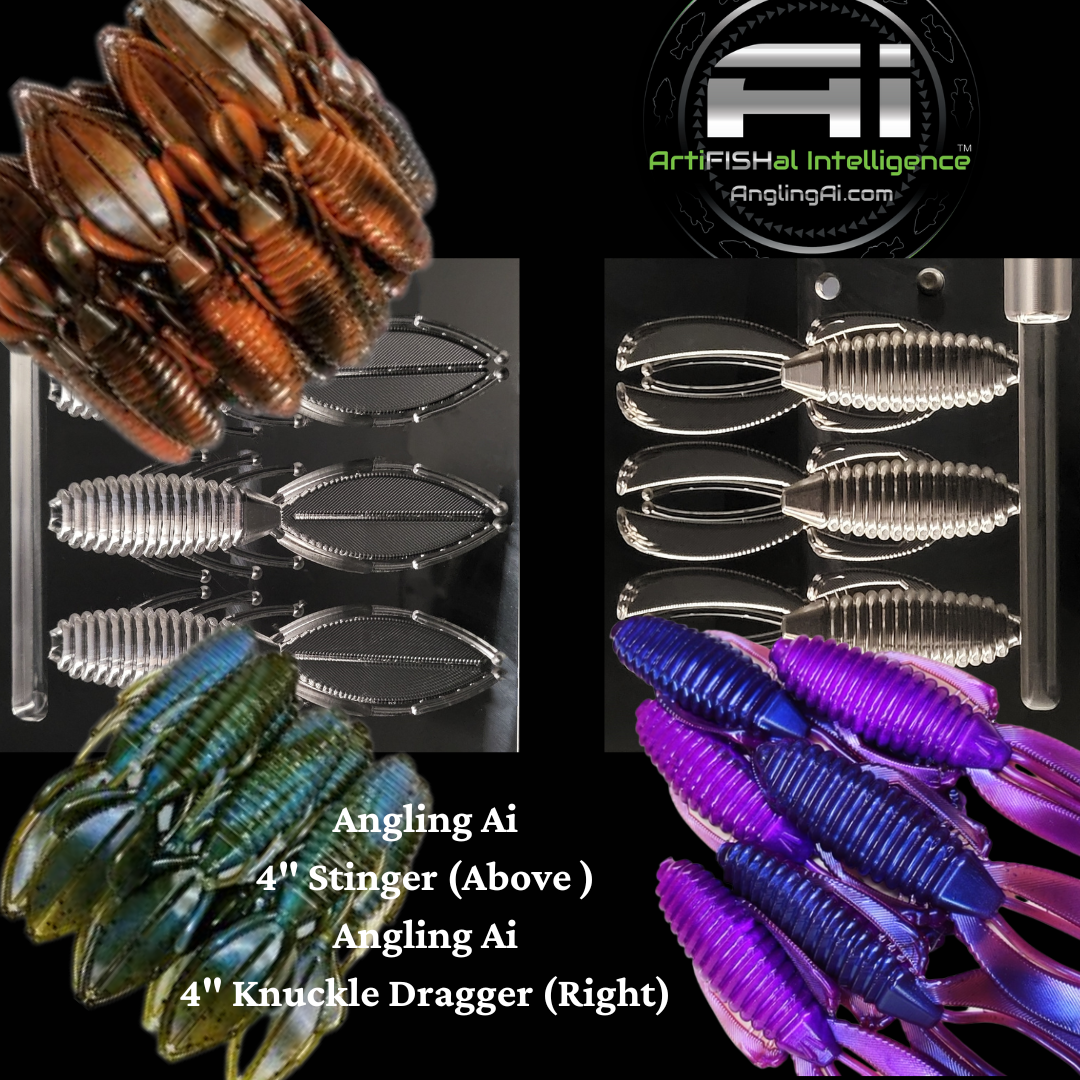
Angling Ai Split Tail Shad Molds
Jerk Bait fishing is your favorite, you say? Angling Ai has several designs to choose from. The injection molds come in 3.75”, 5”, 5.75”, and 8” designs, with a 5” Open Pour Jerk Bait also available. Jerking these lures and letting them slowly suspend and sink will get the nature of the bass to take over. Reactionary strikes using jerk baits during the pre and post-spawn staging times are quite common.
Angling Ai Swimbaits DR/Bloodline Series or AR Worm Series
If ripping or cranking is your preferred way of fishing, you can not go wrong with either line of bait molds.
Our DR and Bloodline series swimbaits come in 3 sizes, 4”, 5”, and 6” versions. The swimbaits are designed the same, but the Bloodline series features the ability to add a Bloodline insert. Both have the ability to add soft plastic eyes before pouring, and there is even an eye mold available for the 4” and 5” sizes to design your own. Hook slots allow you to fish the swimbait with a swimbait hook and screw lock, or order the half-moon inserts from the accessories page and make solid baits to utilize your favorite jig head.
The AR Worm series is available in two sizes, the 5.75” and the 7” Mag size. The Mag size AR Worm is designed as a core shot letting your imagination create almost any color style worm you desire. The worm features a rapid tight tail kick and, when fished pegged, Texas rig style draws reaction strikes when cranked over grass cover.
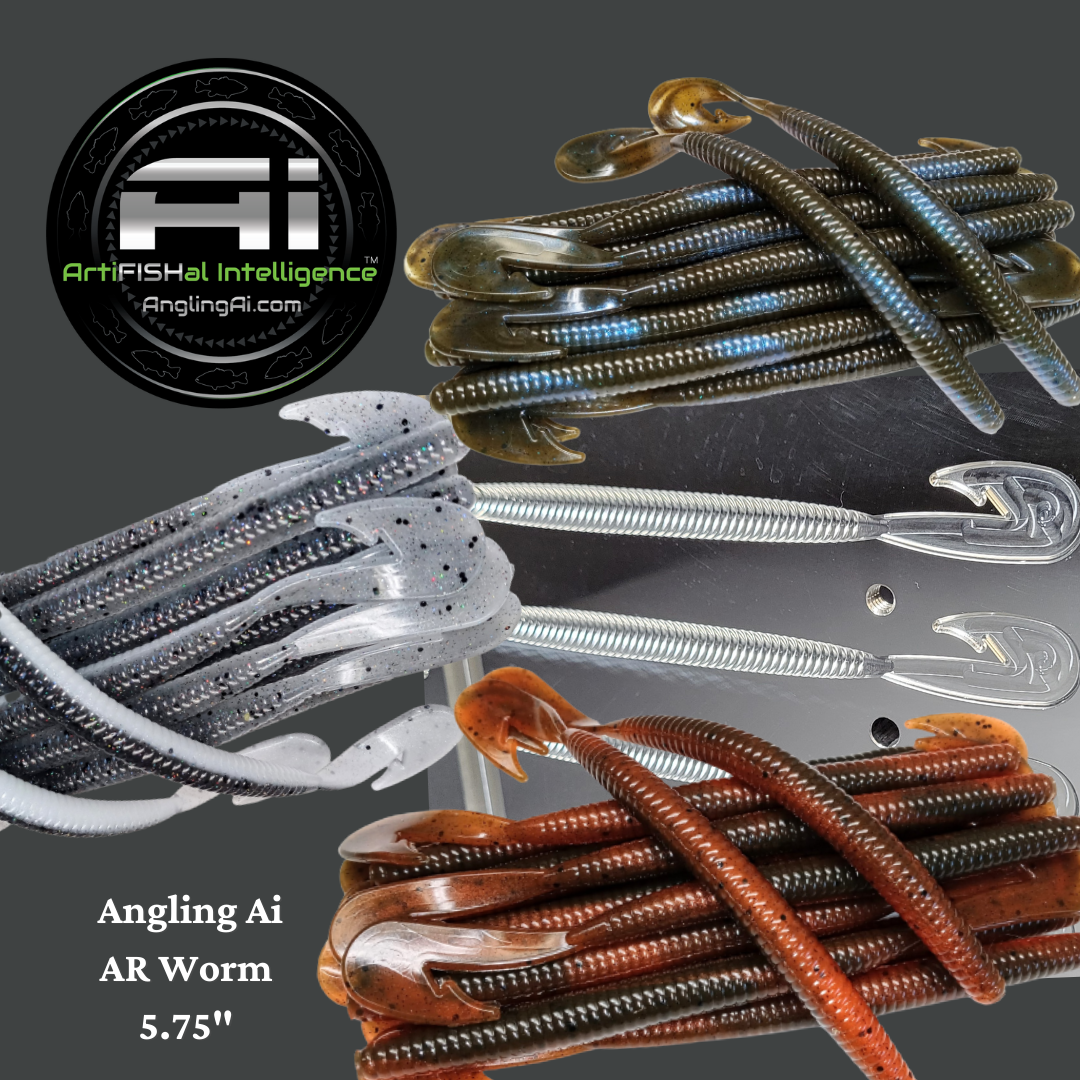
Angling Ai 6” Lizard or 4” EctoCraw
Versatility is a great benefit. These two molds offer a variety of ways for an angler to plan his day. Both can be used with techniques to entice a fish to strike, but they are very beneficial to drawing reaction strikes.
The Angling Ai 6” Lizard also has a tail mold available to create a great presentation. The lure can be swam over grass, flipped into bedding fish situations, banged across the bottom over rocks, or dragged on the bottom as if to scurry away. Pull it over pads, mat, or structure and let it fall right in the face of a hiding bass. This is a wonderful mold that can definitely add to your ability to be stealth-like.
Craws are used in so many ways by anglers, and the Angling Ai 4” Ecto Craw is no exception. The body is designed to be thick enough to use as a trailer and tough enough to be punched if desired. The claws have great flapping action, and anglers can also swim it over grass. A claw mold is also available if one desires to add a little flair to their lure. Whether you are flipping docks, punching through vegetation, or ripping over grass beds, the 4” Ecto Craw can be your lure of choice.
Enjoying Spring Time Fishing
Understanding spawning tendencies and weather patterns will help you get more out of your experience on the water. Many anglers will be out enjoying the new breath of mild temperatures and the great weather. Fishing pressure will increase, and technique fishing to entice a bass to bite will become tougher. Go out and try to get those reaction bites that depend on the nature of the bass. Draw them hiding fish out with the element of surprise and be crafty. “Make Your Baits-Your Way” and plan your attack this spring to be ready for whatever comes your way. Bass will be ready to ambush and strike, so go out and increase your experience on the water.
